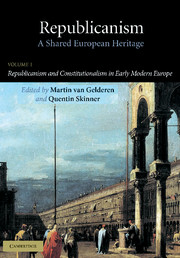Book contents
- Frontmatter
- Contents of Volume I
- Contents of Volume II
- Acknowledgments
- Introduction
- Part I The Rejection of Monarchy
- Part II The Republican Citizen
- Part III The Republican Constitution
- 9 From the Crisis of Civil Culture to the Neapolitan Republic of 1647: Republicanism in Italy between the Sixteenth and Seventeenth Centuries
- 10 Aristotelians, Monarchomachs and Republicans: Sovereignty and respublica mixta in Dutch and German Political Thought, 1580–1650
- 11 Debating the respublica mixta: German and Dutch Political Discourses around 1700
- 12 Classical Foundational Myths of European Republicanism: The Jewish Commonwealth
- 13 Republican Politics in Early Modern Spain: The Castilian and Catalano-Aragonese Traditions
- 14 The Idea of a Republican Constitution in Old Régime France
- 15 Republicanism, Regicide and Republic: The English Experience
- Bibliography
- Contributors
- Index of Names of Persons
- Index of Subjects
14 - The Idea of a Republican Constitution in Old Régime France
Published online by Cambridge University Press: 15 December 2009
- Frontmatter
- Contents of Volume I
- Contents of Volume II
- Acknowledgments
- Introduction
- Part I The Rejection of Monarchy
- Part II The Republican Citizen
- Part III The Republican Constitution
- 9 From the Crisis of Civil Culture to the Neapolitan Republic of 1647: Republicanism in Italy between the Sixteenth and Seventeenth Centuries
- 10 Aristotelians, Monarchomachs and Republicans: Sovereignty and respublica mixta in Dutch and German Political Thought, 1580–1650
- 11 Debating the respublica mixta: German and Dutch Political Discourses around 1700
- 12 Classical Foundational Myths of European Republicanism: The Jewish Commonwealth
- 13 Republican Politics in Early Modern Spain: The Castilian and Catalano-Aragonese Traditions
- 14 The Idea of a Republican Constitution in Old Régime France
- 15 Republicanism, Regicide and Republic: The English Experience
- Bibliography
- Contributors
- Index of Names of Persons
- Index of Subjects
Summary
France first became a republic on 21 September 1792, by declaration of the newly elected Convention. How and when did that event become possible, in the nation whose political culture had sponsored a cult of royal authority like no other in early-modern Europe? It is sometimes suggested that republicanism had no foothold in France prior to the royal family's attempted flight from the Revolution, halted at Varennes in June of 1791 – as if this abortive contingency were alone capable of effecting so massive a shift of loyalties. In reality, of course, the advent of the First Republic was prepared by a long process of ideological contention in the eighteenth century, involving both the gradual delegitimisation of the monarchy and the slow domestication of once-alien republican ideas. What were the stages in this process? We are in a better position than ever before to grasp them, thanks in part to the transformation in our understanding of early-modern political thought wrought by J. G. A. Pocock's Machiavellian Moment. If his own conception of a post-Renaissance ‘Atlantic republican tradition’ was confined to the Anglophone world – to the surprise even of sympathetic critics (see Gilbert 1976: 308; and Shklar 1978) – scholars have in the meantime devoted a good deal of energy to bringing Pocock's perspectives to bear on the career of civic humanism in eighteenth-century and revolutionary France.
- Type
- Chapter
- Information
- RepublicanismA Shared European Heritage, pp. 289 - 306Publisher: Cambridge University PressPrint publication year: 2002
- 5
- Cited by

